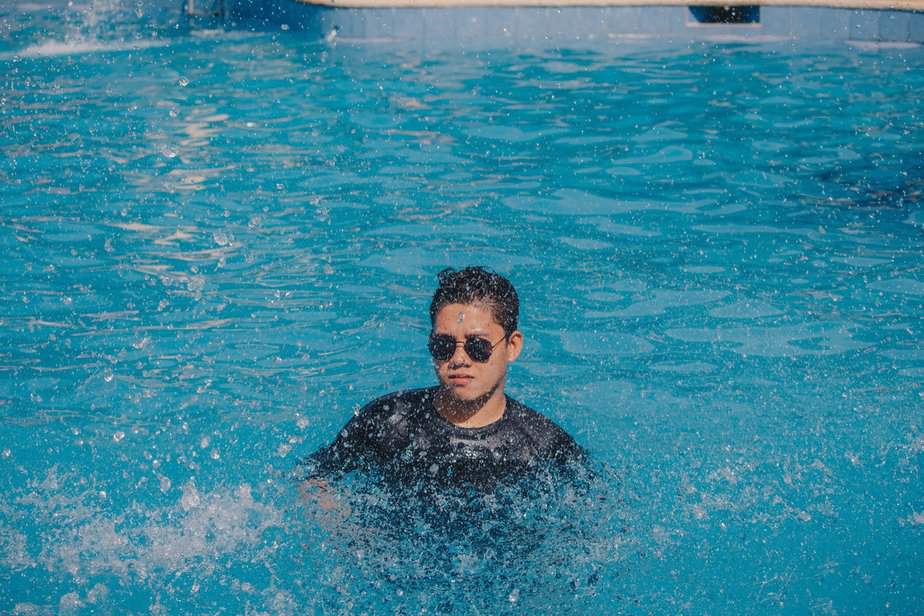What’s so special about swimwear that they are the only clothing allowed at recreational pools? You might think that it’s okay to wear normal clothing like shorts and a T-shirt, but there are many downsides to doing so. The biggest reason is that they negatively impact your personal safety, and some auxiliary reasons are that they can contaminate the pool and clog the filters with lint.
Regular clothes, particularly clothes made with cotton, absorb too much water. This ultimately weighs you down and restricts your movement, increasing your chances of drowning. Your regular clothes can also introduce airborne and waterborne contaminants to the pool, requiring more chlorine to sanitize it. Chlorine can cause clothing fibers to fray and end up in the pool filters. Lastly, chlorine will deteriorate your clothes which decreases their lifespan.
With all of these negative effects, I’m sure you’ll agree that it’s a pretty bad idea to wear regular clothes into the swimming pool even if you were allowed to. That said, you could wear regular clothes to the beach, to private pool parties, or to your own pool. However, knowing the downsides, are you sure that’s a good idea?
In this article, we will go over in greater detail the primary reasons why it’s not a good idea to wear clothes in a swimming pool. We will also explain the importance of wearing appropriate swimwear so you can enjoy the plethora of benefits they provide over regular clothing.
Why are regular clothes banned from swimming pools?

They increase the risk of drowning
With few exceptions, clothing is banned from being worn in swimming pools.
I have seen some pools allow clean, white T-shirts be worn over swimwear. However, you’re still wearing swimwear anyways, plus a damp white T-shirt is see-through, so I’m not really sure why anybody would even bother? You’re inconveniencing yourself for no real benefit unless you just really like to wear T-shirts for some reason.
If you actually look at the dress code for your local swimming pool, it will probably say something to the effect of: “proper swimwear is required to enter the pool water.”
Many people like to argue what “proper swimwear” means, claiming that their regular clothes are made of the same material that swimwear is made of, so that makes it okay to wear while swimming. In a similar vein, many wonder if workout clothes can be worn to the pool.
The reality is that swimwear comes with many swimming-specific features that other clothes do not. For instance, it is made with stretchy, porous materials that allow water to pass through, does not restrict movement, and dries quickly.
Swim trunks will usually have a mesh lining, one piece swimsuits or bikini tops will come with padding or cups so you don’t have to wear your regular bra to the pool, and so on.
Plus, swimwear is much more resistant to chlorine and saltwater damage so you will be able to wear it for much longer without needing to replace it.
Since regular clothes lack most of these features, they can legitimately become a safety issue when worn in the pool. When soaked, they’ll feel much heavier than swimwear, bogging you down and making it hard to stay afloat.
Even outside of the water, regular clothes will remain drenched and you will be soaked for hours, leading to a cold and miserable experience (terrible for a beach day). Conversely, swimwear will dry quickly and you won’t be drenched in water all day, leading to a much better experience.
They will clog the filtration system

Wearing normal clothes directly decreases your safety, but it can do so indirectly as well. Let me explain.
In order for pool water to remain safe, pool maintenance workers are constantly monitoring the chlorine levels and ensuring the pool’s filtration system is running smoothly. Without their hard work, the pool would be a bacteria-filled cesspool with all kinds of nasty stuff floating around in it.
Chlorine, being a harsh chemical, can cause tiny pieces of fabric to break off into the pool. It should not be surprising to know that this also damages your clothing so that its life span will be significantly reduced.
Since chlorine is the primary ingredient in bleach, it’s no wonder that chlorine has a bleaching effect on normal clothing. Dyes in your clothing will be released into the pool when exposed to chlorine, causing the clothing to fade in color while also causing the pool to cloud up.
With the pool’s filtration system being taxed to its limits, it may fail to filter out impurities such as algae, bacteria, and natural debris (hair, dead skin cells, body oils, etc.)
They increase the risk of spreading disease
Clothes can negatively impact the water’s cleanliness by contaminating it with airborne and waterborne diseases and clogging the filters up with lint.
Most people don’t think of themselves as dirty individuals. Yet, even a normal person will come into contact with a plethora of contaminants everyday. Each time you sit at a public seat, desk at school or work, or go to a public bathroom, your clothes can become tainted by untold numbers of microscopic germs.
If you wear these contaminated clothes to the pool, you are introducing these germs to the pool water. But that’s what chlorine is for, right?
Sure, but it’s not enough to just dump a bunch of chlorine into the pool and call it a day because too much chlorine can irritate the skin and cause health problems in high quantities. Thus, anything that disrupts this delicate balance and makes the maintenance worker’s jobs harder is deservedly banned.
Why swimsuits are the best option

Now that you have an idea of why you shouldn’t wear regular clothes to the pool, you might be wondering what makes swimsuits better.
For starters, swimsuits are typically made of spandex/Lycra fabric. This material is stretchy, does not absorb much water, and is more resistant to chlorine than regular street clothes.
In the water you won’t feel weighed down, and the stretchy material will allow you to perform your swim strokes without issue. The end result is that you can easily glide through the water with a swimsuit on.
Even outside of the water, your swimsuit will dry much faster since it didn’t absorb much water in the first place.
That said, swimsuits are not completely immune to chlorine and saltwater’s harmful effects. To ensure your swimsuit lasts as long as possible, remember to thoroughly rinse off the chlorine and salt from your swimsuit as soon as possible.
Otherwise, if chlorine or salt is left to linger, it will make short work of your swimsuit as well. Furthermore, leaving a damp swimsuit in a bag will surely cause mold to grow on it, also effectively ruining it.
Parting words
These are the main reasons why only swimsuits are allowed in swimming pools, and why regular clothes are generally forbidden. If you want to wear regular clothes in a swimming pool, do so in your own pool or at a friend’s pool party. However, you are putting yourself at risk of all of the problems mentioned, so are you sure you really want to do that?
If the reason you are wondering if clothes can be worn in a swimming pool is because you are on a tight budget and are hoping to save money, there are better ways to do so.
For example, making it a habit to wash your swimsuit after every use will ensure that it lasts much longer so that you don’t have to buy a new swimsuit every year.
Or, if you are up for it, you can consider buying used swimsuits. If you go this route, there are some precautions you need to take to protect yourself. However, the benefit is that you can potentially get name brand swimwear for a fraction of their original price, saving you plenty of money.
Whichever option you decide, it is surely a better choice than wearing regular clothes in the swimming pool because, well, you’re not allowed to. Wear a proper swimsuit instead.


